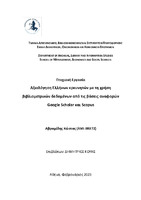Αξιολόγηση Ελλήνων ερευνητών με τη χρήση βιβλιομετρικών δεδομένων από τις βάσεις αναφορών Google Scholar και Scopus
Evaluation of Greek researchers with the use of bibliometric data from reference databases Google Scholar and Scopus

Λέξεις-κλειδιά
Google Scholar ; Scopus ; Βιβλιομετρικοί δείκτες ; Open Refine ; Jasp ; Papers ; Citations ; Bibliometric indicatorsΠερίληψη
Στην παρούσα εργασία γίνεται εκτενής έρευνα στα βιβλιομετρικά δεδομένα των βάσεων
Scopus και Google Scholar του ακαδημαϊκού προσωπικού διάφορων πανεπιστημιακών
ιδρυμάτων στην Ελλάδα. Έχουν καταγραφεί δεδομένα που αφορούν στοιχεία του κάθε
ερευνητή όπως το φύλο, η βαθμίδα, το πανεπιστημιακό πεδίο, το ίδρυμα αλλά και το τμήμα
του καθενός.
Από τις βάσεις δεδομένων έχουν αντληθεί βιβλιομετρικά στοιχεία, τα οποία με τη χρήση των
εργαλείων Open Refine και Jasp θα συγκριθούν μέσα από πίνακες και διαγράμματα. Μερικά
στοιχεία ενδεικτικά είναι o αριθμός των δημοσιεύσεων, των αναφορών (citations), οι δείκτες
h-index, g-index κτλ.
Από αυτές τις συγκρίσεις θα προκύψουν συμπεράσματα, όπως ο λόγος που η ανώτερη
βαθμίδα των ερευνητών έχει καλύτερα αποτελέσματα, οι αιτίες που συγκεκριμένα τμήματα
και επιστημονικά πεδία αποδίδουν καλύτερα αλλά και ο λόγος που το Google Scholar έχει
αριθμητικά περισσότερα αποτελέσματα σε σχέση με το Scopus.
Περίληψη
The present work conducts extensive research on the bibliometric data from the databases of
Scopus and Google Scholar of the academic staff of various universities in Greece. Data has
been retrieved for each researcher for various bibliometric indicators. The analysis of the data
takes into account the gender, the degree, the scientific field, the institution, and the
department.
Bibliometric data has been collected from two different citation indexes databases and will be
compared using the Open Refine and Jasp tools, through tables and graphs. Some of the
indicative indicators include papers, citations, h-index, g-index, etc.
From the comparison of the data, conclusions will be drawn, such as the reason why higher
rank researchers exhibit better results, why specific departments and scientific fields yield
better results, and why Google Scholar has increased values compared to Scopus.

